高中常考非谓语动词搭配【高考复习总结】
英语语法非谓语动词搭配必背笔记

英语语法非谓语动词搭配必背笔记一、动词不定式(Infinitive)动词不定式是动词的一种非谓语形式,一般由to加动词原形构成。
它可以在句中担任名词、形容词或副词的作用。
1. 作主语To learn English well requires patience and perseverance.2. 作宾语He promised to help me with my homework.3. 作宾语补足语I want to become a doctor when I grow up.4. 作状语She went to the library to borrow some books.5. 作定语She is the first person to arrive at the party.二、动词动名词(Gerund)动词动名词是动词的一种非谓语形式,一般由动词原形加ing构成。
它可以在句中担任名词、形容词或副词的作用。
1. 作主语Swimming is my favorite sport.2. 作宾语I enjoy painting in my free time.3. 作宾语补足语She kept her promise of helping the poor.4. 作状语He left without saying goodbye.5. 作定语The running water sounds very soothing.三、现在分词(Present Participle)现在分词是动词的一种非谓语形式,一般由动词原形加ing构成。
它可以在句中担任形容词或副词的作用。
1. 作定语The crying baby woke up everyone in the house.2. 作状语She entered the room, singing a beautiful song.四、过去分词(Past Participle)过去分词是动词的一种非谓语形式,一般由动词的过去分词形式构成。
高考英语非谓语动词总结
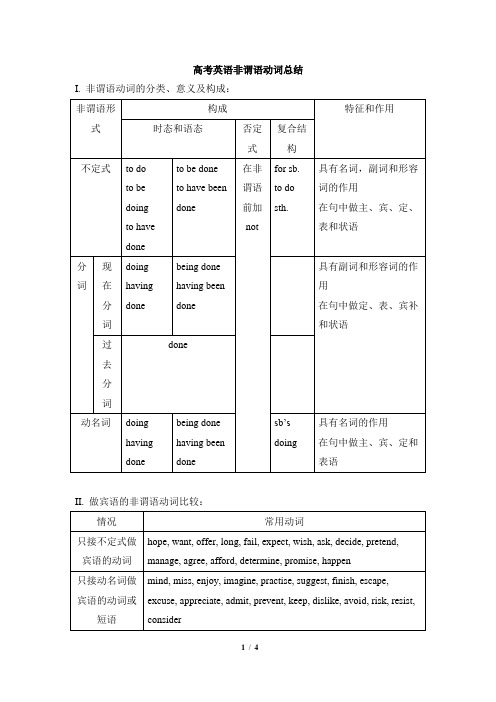
I heard him call me several times.
have, notice, see, watch, hear, feel, let, make
现在分词
notice, see, watch, hear, find, keep, have, feel
高考英语非谓语动词总结
I.非谓语动词的分类、意义及构成:
非谓语形式
构成
特征和作用
时态和语态
否定式
复合结构
不定式
to do
to be doing
to have done
to be done
to have been done
在非谓语前加not
for sb. to do sth.
具有名词,副词和形容词的作用
I have a lot of papers to type.
I have a lot of papers to be typed.
动名词
通常指被修饰词的用途,无逻辑上的任何关系
Shall we go to the swimming pool?
现在分词
与被修饰词之间是主谓关系,表示动作与谓语动作同时发生
两者都可以
意义基本相同
begin, start, like, love, hate, prefer, continue(接不定式多指具体的动作,接动名词多指一般或习惯行为)
need, want, require(接动名词主动形式表示被动意义,若接不定式则应用被动形式)
意义相反
stop to do停止手中事,去做另一件事
主谓关系。强调动作正在进行,尚未完成
I found her listening to the radio.
最全高中非谓语动词固定搭配总结
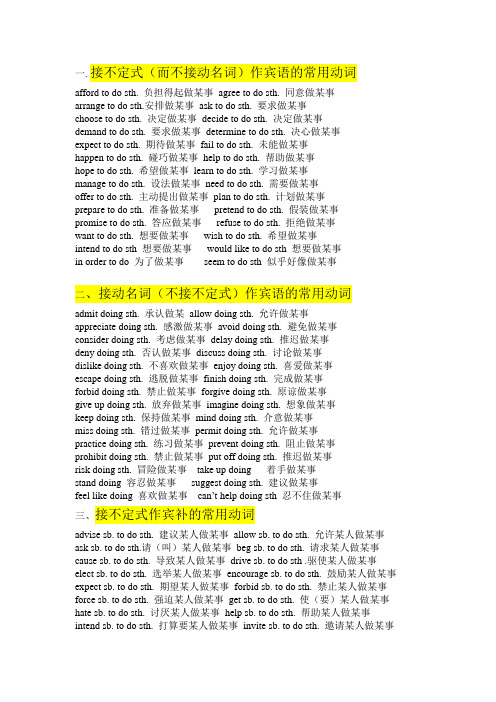
一.接不定式(而不接动名词)作宾语的常用动词afford to do sth. 负担得起做某事agree to do sth. 同意做某事arrange to do sth.安排做某事ask to do sth. 要求做某事choose to do sth. 决定做某事decide to do sth. 决定做某事demand to do sth. 要求做某事determine to do sth. 决心做某事expect to do sth. 期待做某事fail to do sth. 未能做某事happen to do sth. 碰巧做某事help to do sth. 帮助做某事hope to do sth. 希望做某事learn to do sth. 学习做某事manage to do sth. 设法做某事need to do sth. 需要做某事offer to do sth. 主动提出做某事plan to do sth. 计划做某事prepare to do sth. 准备做某事pretend to do sth. 假装做某事promise to do sth. 答应做某事refuse to do sth. 拒绝做某事want to do sth. 想要做某事wish to do sth. 希望做某事intend to do sth 想要做某事would like to do sth 想要做某事in order to do 为了做某事seem to do sth 似乎好像做某事二、接动名词(不接不定式)作宾语的常用动词admit doing sth. 承认做某allow doing sth. 允许做某事appreciate doing sth. 感激做某事avoid doing sth. 避免做某事consider doing sth. 考虑做某事delay doing sth. 推迟做某事deny doing sth. 否认做某事discuss doing sth. 讨论做某事dislike doing sth. 不喜欢做某事enjoy doing sth. 喜爱做某事escape doing sth. 逃脱做某事finish doing sth. 完成做某事forbid doing sth. 禁止做某事forgive doing sth. 原谅做某事give up doing sth. 放弃做某事imagine doing sth. 想象做某事keep doing sth. 保持做某事mind doing sth. 介意做某事miss doing sth. 错过做某事permit doing sth. 允许做某事practice doing sth. 练习做某事prevent doing sth. 阻止做某事prohibit doing sth. 禁止做某事put off doing sth. 推迟做某事risk doing sth. 冒险做某事take up doing 着手做某事stand doing 容忍做某事suggest doing sth. 建议做某事feel like doing 喜欢做某事can’t help doing sth 忍不住做某事三、接不定式作宾补的常用动词advise sb. to do sth. 建议某人做某事allow sb. to do sth. 允许某人做某事ask sb. to do sth.请(叫)某人做某事beg sb. to do sth. 请求某人做某事cause sb. to do sth. 导致某人做某事drive sb. to do sth .驱使某人做某事elect sb. to do sth. 选举某人做某事encourage sb. to do sth. 鼓励某人做某事expect sb. to do sth. 期望某人做某事forbid sb. to do sth. 禁止某人做某事force sb. to do sth. 强迫某人做某事get sb. to do sth. 使(要)某人做某事hate sb. to do sth. 讨厌某人做某事help sb. to do sth. 帮助某人做某事intend sb. to do sth. 打算要某人做某事invite sb. to do sth. 邀请某人做某事leave sb. to do sth. 留下某人做某事like sb. to do sth. 喜欢某人做某事need sb. to do sth. 需要某人做某事order sb. to do sth. 命令某人做某事permit sb. to do sth. 允许某人做某事persuade sb. to do sth. 说服某人做某事request sb. to do sth. 要求某人做某事remind sb. to do sth. 提醒某人做某事teach sb. to do sth .教某人做某事tell sb. to do sth. 告诉某人做某事trouble sb. to do sth. 麻烦某人做某事want sb. to do sth. 想要某人做某事warn sb. to do sth. 警告某人做某事wish sb. to do sth. 希望某人做某事四、接现在分词作宾补的常用动词catch sb. doing sth. 碰上某人做某事discover sb. doing sth. 发现某人做某事find sb. doing sth. 碰上(撞上)某人做某事have sb. doing sth.使某人一直做某事keep sb. doing sth. 使某人不停地做某事notice sb. doing sth. 注意到某人正在做某事watch sb. doing sth. 观看某人正在做某事leave sth/sb doing sth 让某人某事一直做某事,置之不理,任其发展五、接动词原形作宾补的常用动词have/make/get sb. do sth. 使某人做某事let sb. do sth. 让某人做某事六.接现在分词或动词原形作宾补意义不同的动词see sb do/doing sth hear sb do/doing补充:be seen to do sth be heard to do sth be made to do sth七、接不定式或动名词作宾语意思相同的动词like to do sth / like doing sth. 喜欢做某事llove to do sth / love doing sth. 喜欢做某事hate to do sth / hate doing sth. 憎恨做某事prefer to do sth / prefer doing sth. 宁可做某事begin to do sth / begin doing sth. 开始做某事start to do sth / start doing sth. 开始做某事continue to do sth / continue doing sth. 继续做某事can’t bear to do sth / can’t bear doing sth. 不能忍受做某事八、接不定式或动名词作宾语意思用法不同的动词(1)remember to do sth. 记住要做某事remember doing sth. 记住曾做过某事(2)forget to do sth. 忘记要做某事forget doing sth. 忘记曾做过某事(3)regret to do sth. 后悔(遗憾)要做某事regret doing sth. 后悔曾做过某事(4)try to do sth. 设法要做某事try doing sth. 做某事试试看有何效果(5)mean to do sth. 打算做某事mean doing sth. 意味着做某事(6)stop to do sth停下来做另一件事情stop doing 停下正在做的事情(7)go on to do sth. 做完某事后接着做另一事go on doing sth. 继续做一直在九.带to doing sth.的常用结构。
高中英语知识点归纳非谓语动词的用法
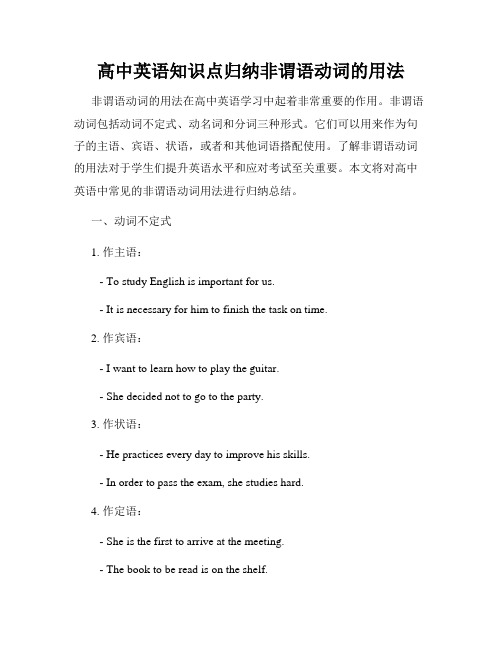
高中英语知识点归纳非谓语动词的用法非谓语动词的用法在高中英语学习中起着非常重要的作用。
非谓语动词包括动词不定式、动名词和分词三种形式。
它们可以用来作为句子的主语、宾语、状语,或者和其他词语搭配使用。
了解非谓语动词的用法对于学生们提升英语水平和应对考试至关重要。
本文将对高中英语中常见的非谓语动词用法进行归纳总结。
一、动词不定式1. 作主语:- To study English is important for us.- It is necessary for him to finish the task on time.2. 作宾语:- I want to learn how to play the guitar.- She decided not to go to the party.3. 作状语:- He practices every day to improve his skills.- In order to pass the exam, she studies hard.4. 作定语:- She is the first to arrive at the meeting.- The book to be read is on the shelf.5. 作表语:- My dream is to become a doctor.- The important thing is to keep calm.6. 作补语:- I need you to help me with the project.- He made her laugh.二、动名词1. 作主语:- Learning a new language requires patience. - Swimming is good for health.2. 作宾语:- I enjoy reading books in my free time.- She admitted stealing the money.3. 作状语:- He left without saying goodbye.- She passed the test by studying hard.4. 作定语:- The running water is very clean.- I heard someone singing in the distance.5. 作表语:- His favorite hobby is playing basketball.- The key to success is hard work.6. 作补语:- I started regretting not studying harder.- They kept us waiting for hours.三、分词1. 现在分词(-ing形式):- The running boy is my brother.- She saw a smoking man on the street.2. 过去分词(-ed/-en形式):- The broken vase needs to be replaced.- They were excited by the surprising news.3. 作状语:- Enjoying the beautiful scenery, we went for a walk.- Being well-prepared, she felt confident in the interview.4. 作定语:- The lost cat was found by its owner.- The written report should be handed in by tomorrow.5. 作补语:- She was surprised to find her car stolen.- I felt exhausted after running for an hour.综上所述,高中英语中的非谓语动词有动词不定式、动名词和分词三种形式,它们在句子中能够充当不同的成分,起到丰富语言表达和提高语言准确性的作用。
高中英语:非谓语动词考点全总结!含义+用法+例题讲解
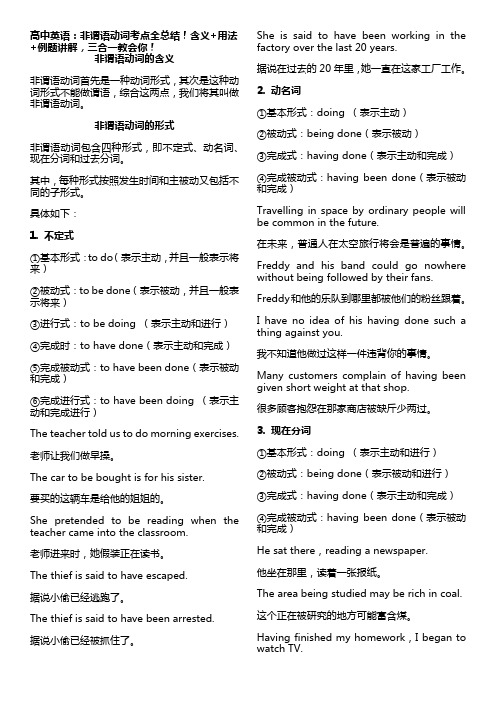
高中英语:非谓语动词考点全总结!含义+用法+例题讲解,三合一教会你!非谓语动词的含义非谓语动词首先是一种动词形式,其次是这种动词形式不能做谓语,综合这两点,我们将其叫做非谓语动词。
非谓语动词的形式非谓语动词包含四种形式,即不定式、动名词、现在分词和过去分词。
其中,每种形式按照发生时间和主被动又包括不同的子形式。
具体如下:1. 不定式①基本形式:to do(表示主动,并且一般表示将来)②被动式:to be done(表示被动,并且一般表示将来)③进行式:to be doing (表示主动和进行)④完成时:to have done(表示主动和完成)⑤完成被动式:to have been done(表示被动和完成)⑥完成进行式:to have been doing (表示主动和完成进行)The teacher told us to do morning exercises. 老师让我们做早操。
The car to be bought is for his sister.要买的这辆车是给他的姐姐的。
She pretended to be reading when the teacher came into the classroom.老师进来时,她假装正在读书。
The thief is said to have escaped.据说小偷已经逃跑了。
The thief is said to have been arrested.据说小偷已经被抓住了。
She is said to have been working in the factory over the last 20 years.据说在过去的20年里,她一直在这家工厂工作。
2. 动名词①基本形式:doing (表示主动)②被动式:being done(表示被动)③完成式:having done(表示主动和完成)④完成被动式:having been done(表示被动和完成)Travelling in space by ordinary people will be common in the future.在未来,普通人在太空旅行将会是普遍的事情。
(高考非谓语动词用法总结)
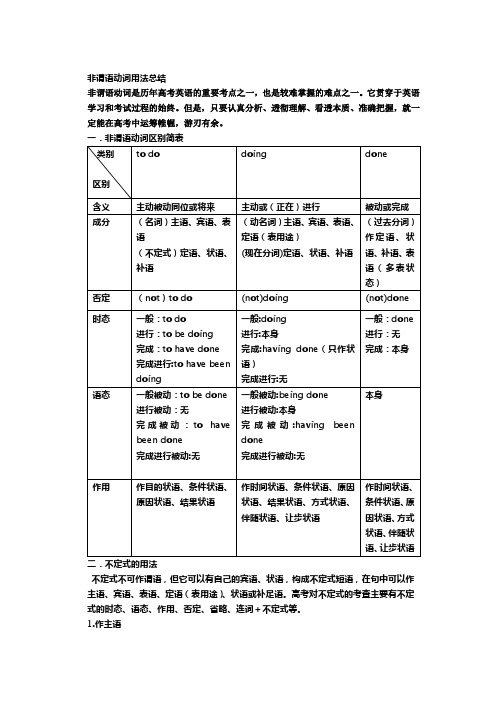
非谓语动词用法总结非谓语动词是历年高考英语的重要考点之一,也是较难掌握的难点之一。
它贯穿于英语学习和考试过程的始终。
但是,只要认真分析、透彻理解、看透本质、准确把握,就一定能在高考中运筹帷幄,游刃有余。
一.非谓语动词区别简表二.不定式的用法不定式不可作谓语,但它可以有自己的宾语、状语,构成不定式短语,在句中可以作主语、宾语、表语、定语(表用途)、状语或补足语。
高考对不定式的考查主要有不定式的时态、语态、作用、否定、省略、连词+不定式等。
1.作主语不定式作主语表示具体的动作,通常指一件已知的事或目的。
不定式作主语时,谓语动词用单数。
eg:To say is a thing,to do is another.(说是一回事,做是另外一回事。
)(2)不定式短语较长时,通常放在谓语之后,用it作形式主语。
eg:①It is important to learn English well.(学好英语是重要的。
)②It is necessary for us to do the job well.(我们做好这项工作是必要的。
)③It is a great honor to be invited to give a speech here.(被邀请在这儿发表演讲是一个极大的荣幸。
)2.作宾语(1)常只用不定式作宾语的动词有:want,wish,hope,long,expect,desire,intend,decide,ask,promise,aim,offer,agree,plan,l earn,choose,refuse,fail,manage,pretend等。
eg:①He refused to help me.(他拒绝帮助我.)②She has agreed to come tomorrow.(他已同意明天来.)(2) 不定式较长时,作宾语,也可用it代替,放在后面。
eg;I find it difficult to do the job well.(3) “特殊疑问词﹢不定式to do结构”具有名词特征,可作宾语。
高考英语:非谓语动词考点

外教一对一高考英语:非谓语动词考点一、分类:动词不定式、动词-ing形式、动词的过去分词总的特点:1.非谓语动词作状语时,其逻辑主语与主句主语保持一致。
2.Doing/To do (sth.)+单数V : 非谓语动词作主语,谓语用单数。
二、动词不定式1、特点:表将来2、形式:①基本型:to+动词原形(do)。
②被动式:to be done ③完成时:to have done ④进行时:to be doing3、句子功能:主语、宾语、表语、定语、状语、补语(宾补)Eg: ①To catch the early train, you`ll have to get up early.(目的状语)②I rushed there in a taxi only to find the library closed.(结果状语:意外结果)。
③This i s very good music to dance to.(定语)④It is necessary to learn English well.(主语,it 为形式主语)4、不定式的省略1)(为了避免重复)并列结构中第二个to:I want to get up early and read English.例外:前后表对比时,to不可省去:To be or not to be ,that is the question.It is better to lose one’s life than to lose one’s spirit.2) (为了避免重复)省去to后的不定式结构:—Would you like to go shopping?—Yes,I`d like to.例外:to后有have/be时,保留be或have—Did you go shopping yesterday? —No, but I ought to have.5、不定式主动形式表被动意义外教一对一1)主(sth)+ be + 主补/表语(表性质的adj. + to do)2) 主+Vt + 宾语 + 宾补(adj.+ to do)3) 主 + Vt+ 宾语+定语(to do): 不定式作定语与所修饰的名词(代词)构成逻辑动宾关系,又和该句主语构成逻辑上的主谓关系。
(完整版)非谓语动词考点总结归纳

Tom is sure of passing the exam. ( Tom 对自己通过考试很有把握 .)
考点三:非谓语动词作表语 不定式、动名词、分词做表语:
1. 不定式做表语常表示谓语动词所表示动作之后发生的动作。不定式一般紧跟在系动词如
: be, seem, remain,
appear 等后面 , 用来说明主语的内容。这类结构中的主语一般为名词,如:
We met many guests ,most of them Americans.( 补充说明 )
非谓语动词考点总结归纳
非谓语动词包括 不定式,动名词和分词 。它们是高中所学的基础语法,也是高考必考内容。既是高考的难点又是 高考的热点。真正领悟非谓语动词的用法要具备以下基础知识:
①具有句子结构的知识,会分析句子成分。 ②具有简单句最基本的五种句型的知识,要分得清双宾语和复合宾语。 ③具有扎实而丰富的动词知识,要分得清及物动词和不及物动词。 ④具备各种复合句的知o melt.
2) 当 begin 和 start 用于进行时时 .
eg: He is beginning to study English.
3) 当 begin 和 start 后面跟着一些表示心理状态的词时 . eg: I began to believe his story.
2.分词 解题诀窍:找逻辑主语,辨逻辑关系,析动作先后
语法作用:
1)表示时间,相当于表示时间,相当于状语从句
when, while 。常用于连词 When, before, while, after,
since 等后面。也可以省略连词
eg. When allowed, we are supposed to come into the room.
高中英语知识点归纳非谓语动词的用法及常见形式
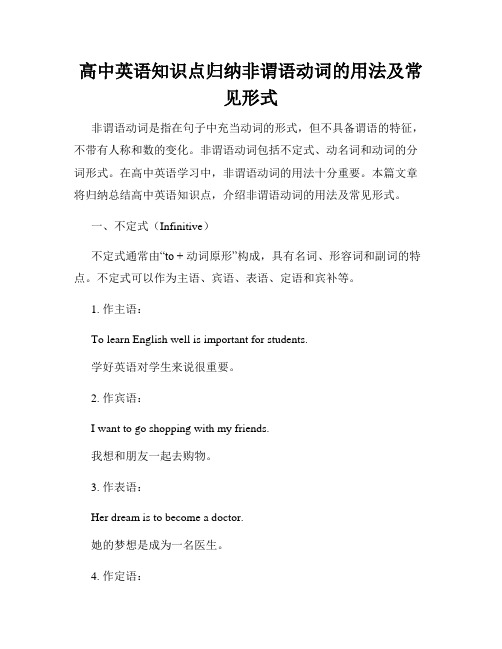
高中英语知识点归纳非谓语动词的用法及常见形式非谓语动词是指在句子中充当动词的形式,但不具备谓语的特征,不带有人称和数的变化。
非谓语动词包括不定式、动名词和动词的分词形式。
在高中英语学习中,非谓语动词的用法十分重要。
本篇文章将归纳总结高中英语知识点,介绍非谓语动词的用法及常见形式。
一、不定式(Infinitive)不定式通常由“to + 动词原形”构成,具有名词、形容词和副词的特点。
不定式可以作为主语、宾语、表语、定语和宾补等。
1. 作主语:To learn English well is important for students.学好英语对学生来说很重要。
2. 作宾语:I want to go shopping with my friends.我想和朋友一起去购物。
3. 作表语:Her dream is to become a doctor.她的梦想是成为一名医生。
4. 作定语:The best way to learn a foreign language is to practice more.学习外语的最好方法就是多练习。
5. 作宾补:She asked me to finish the report as soon as possible.她要求我尽快完成报告。
二、动名词(Gerund)动名词以动词的现在分词形式(-ing)作为主要构词方式,具有名词的特点,可作为名词的任何功能。
1. 作主语:Studying hard is the key to success.努力学习是取得成功的关键。
2. 作宾语:I enjoy singing in the shower.我喜欢在淋浴时唱歌。
3. 作表语:His favorite activity is swimming.他最喜欢的活动是游泳。
4. 作定语:I have a writing class tomorrow.我明天有一节写作课。
5. 作宾补:They felt like going for a walk after dinner.晚饭后他们想去散步。
高中非谓语动词语法总结
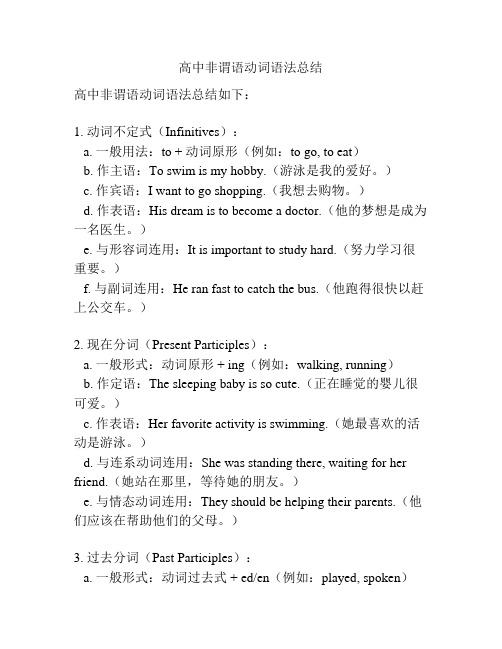
高中非谓语动词语法总结高中非谓语动词语法总结如下:1. 动词不定式(Infinitives):a. 一般用法:to + 动词原形(例如:to go, to eat)b. 作主语:To swim is my hobby.(游泳是我的爱好。
)c. 作宾语:I want to go shopping.(我想去购物。
)d. 作表语:His dream is to become a doctor.(他的梦想是成为一名医生。
)e. 与形容词连用:It is important to study hard.(努力学习很重要。
)f. 与副词连用:He ran fast to catch the bus.(他跑得很快以赶上公交车。
)2. 现在分词(Present Participles):a. 一般形式:动词原形 + ing(例如:walking, running)b. 作定语:The sleeping baby is so cute.(正在睡觉的婴儿很可爱。
)c. 作表语:Her favorite activity is swimming.(她最喜欢的活动是游泳。
)d. 与连系动词连用:She was standing there, waiting for her friend.(她站在那里,等待她的朋友。
)e. 与情态动词连用:They should be helping their parents.(他们应该在帮助他们的父母。
)3. 过去分词(Past Participles):a. 一般形式:动词过去式 + ed/en(例如:played, spoken)b. 作表语:The movie was watched by millions of people.(那部电影被成千上万的人观看。
)c. 作定语:The broken window needs to be fixed.(那个破窗户需要修理。
)d. 与助动词连用:They have finished their homework.(他们已经完成了作业。
高中非谓语动词知识点汇总

高中非谓语动词知识点汇总非谓语动词是指动词的非谓语形式,包括不定式、动名词和分词。
它们在句子中常常作状语、宾语、表语等成分,起到修饰或补充说明的作用。
高中阶段,学生需要掌握非谓语动词的形式、用法及常见搭配,并能够正确运用于句子中。
下面将对高中非谓语动词的知识点进行详细汇总。
1. 不定式(Infinitive)不定式是动词的一种形式,具有名词、形容词和副词的特点。
不定式的基本形式是“to + 动词原形”,在句中可以作主语、表语、宾语、宾语补足语、定语和状语等。
【基本形式】不定式的基本形式是“to + 动词原形”,如:to eat(吃)、to go (去)等。
【作主语】不定式可以作主语,如:- To study is essential for students.(学生学习是必要的)【作表语】不定式可以作表语,如:- His dream is to become a doctor.(他的梦想是成为一名医生)【作宾语】不定式可以作及物动词的宾语,如:- I want to learn English.(我想学英语)【作宾语补足语】不定式可以作及物动词的宾语补足语,如:- They made him apologize to the teacher.(他们让他向老师道歉)【作定语】不定式可以作定语,修饰名词,如:- She has a lot of books to read.(她有很多书要读)【作状语】不定式可以作状语,修饰动词、形容词、副词或整个句子,如:- We work hard to achieve our goals.(我们努力工作以实现我们的目标)2. 动名词(Gerund)动名词是动词的一种形式,具有名词的特点,它的形式是动词的ing形式。
动名词可以作主语、表语、宾语、宾语补足语、定语和状语等。
【基本形式】动名词的基本形式是动词的ing形式,如:- Eating(吃), sleeping(睡觉),running(跑步)等。
非谓语知识点总结高中

非谓语知识点总结高中在汉语语法中,非谓语是指不具备谓语功能的动词、形容词、副词的非独立使用形式,它不能单独在句子中担任谓语,而必须依附于别的词来表达意义,主要包括动词不定式、动名词和分词。
非谓语在句子中可以作定语、状语、宾语等。
一、动词不定式动词不定式由“to+动词原形”构成,主要有三种用法:1. 作目的状语如:I went to the library to borrow some books.(我去图书馆借书。
)2. 作目的状语如:He is too young to drive.(他太年轻了,不能开车。
)3. 作宾语如:I like to play basketball.(我喜欢打篮球。
)二、动名词动名词是动词+ing构成的名词,主要有以下几种用法:1. 作主语如:Swimming is good exercise.(游泳是一种很好的锻炼。
)2. 作宾语如:She enjoys reading.(她喜欢阅读。
)3. 作宾语补足语如:I saw him crossing the street.(我看见他正在过马路。
)三、分词分词是动词的一种非谓语形式,主要有现在分词和过去分词两种形式。
分词主要有以下几种用法:1. 现在分词作状语如:Walking along the street, I found a wallet on the ground.(我沿着街走的时候,在地上发现了一个钱包。
)2. 现在分词作状语如:He heard a girl singing.(他听见一个女孩在唱歌。
)3. 过去分词作定语如:The broken window was replaced.(破碎的窗户被换掉。
)总之,非谓语作为一种重要的语法现象,在英语句子中具有广泛的应用,熟练掌握非谓语的用法对于提高英语语言水平是非常有帮助的。
高中英语非谓语动词用法小结

高中英语非谓语动词用法小结一、不定式1. 不定式的形式:to + 动词原形2. 不定式作目的状语不定式常用于表示目的的短语中,可以置于句首、句中或句末。
例如:- He came to help us.- I work hard to pass the exam.- We need to study hard in order to succeed.7. 不定式的完成形式不定式的完成形式为to have + 过去分词,用来表示动作发生在不定式之前。
例如:- I am glad to have finished my work.8. 动词不定式的主动形式与被动形式动词不定式有主动形式与被动形式。
被动形式是由to be + 过去分词构成的。
主动形式用于表示主动或被动,被动形式用于表示被动。
例如:- I want to finish my homework.(主动)- I want my homework to be finished.(被动)二、动名词1. 动名词的构成动名词的基本形式是动词的-ing形式。
2. 动名词作主语动名词可以作主语。
当动名词作主语时,谓语动词通常用单数形式。
例如:- Smoking is bad for your health.- Swimming is a popular sport.三、现在分词和过去分词1. 现在分词的构成现在分词由动词原形+ing构成。
3. 过去分词的构成过去分词分为规则变化和不规则变化两种。
小结:高中英语非谓语动词主要包括不定式、动名词、现在分词和过去分词。
不定式可以作目的状语、结果状语、定语和后置定语等;动名词可以作主语、宾语、介词宾语和表语等;现在分词可以作定语和表语等;过去分词可以作定语和表语等。
熟练掌握非谓语动词的用法,能够使语言更加准确、丰富,提高表达的灵活性和准确性。
高考英语复习非谓语动词固定搭配清单

非谓语动词固定搭配及动词词组一.接不定式作宾语的常用动词/短语“原谅某人做某事” excuse [forgive] sb. for doing sth.“安排某人做某事” arrange for sb. to do sth.“要求某人做某事” demand of sb. to do sth.“感谢某人做某事” thank sb. for doing sth. =be grateful to sb. for doing sth. “祝贺某人做某事” congratulate sb. on doing sth.“阻止某人做某事” prevent sb. from doing sth.六、接不定式或动名词作宾语意思相同的动词like to do sth / like doing sth. 喜欢做某事llove to do sth / love doing sth. 喜欢做某事hate to do sth / hate doing sth. 憎恨做某事prefer to do sth / prefer doing sth. 宁可做某事begin to do sth / begin doing sth. 开始做某事start to do sth / start doing sth. 开始做某事continue to do sth / continue doing sth. 继续做某事can’t bear to do sth / can’t bear doing sth. 不能忍受做某事七、可接不同非谓语的动词及结构(1)使役动词(have/make/get/leave/keep)have/make A do/done /doing get/leave A to do/ done /doing keep A doing(2)感官类see/hear A do/doing/done find/catch A doing sth.(3) with A doing/done/to do八、可接双宾语的常用动词误:operate sb. 正:operate on sb. 为某人做手术误:participate sth. 正:participate in sth. 参加某事误:refer sth. 正:refer to sth. 查阅(参考)某物误:reply a letter 正:reply to a letter 回信十二、容易误用作不及物动词的及物动词误:serve for sb. 正:serve sb. 为某人服务误:marry with sb. 正:marry sb. 与某人结婚误:discuss about sth. 正:discuss sth. 讨论某事误:mention about sth. 正:mention sth. 提到某事误:enter into a room 正:enter a room 进入房间误:ring to sb. 正:ring sb. 给某人打be angry about 为…生气be anxious about 为…担忧be careful about 当心… be certain about 确信…be curious about 对…好奇be disappointed about 对…失望be excited about 对…感到兴奋be glad about 对…感到高兴be happy about 为…感到高兴be hopeful about 对…抱有希望be mad about 对…入迷be nervous about 为…感到不安be particular about 对…讲究be sad about 为…而难过be serious about 对…认真be sure about 对…有把握be worried about 为…担忧十五、常用“be+形容词+at”结构be angry at 为…生气be good/bad at 擅长于/不善于…be clever at 擅长于…be disappointed at 对…失望be expert at/in 在…方面是内行be mad at 对…发怒十六、常用“be+形容词+for”结构be anxious for 渴望be good/bad for 对…有利/有害be convenient for 对…方便be necessary for 对…有必要be eager for渴望be famous/ wellknown for 因…闻名be grateful/thankful for 感谢be hungry for 渴望得到be late for 迟到be fit/suitable for 合适,适合be ready for 为…准备好be sorry for 因…抱歉十七、常用“be+形容词+from”结构be absent from 缺席,不在be different from 与…不同be far from 离…远,远远不be free from/of 没有,免受be safe from 没有…的危险be tired from 因…而疲劳十八、常用“be+形容词+in”结构be engaged in 从事于,忙于be experienced in 在…方面有经验be lack in 缺乏be rich in 富于,在…方面富有be successful in 在…方面成功be weak in 在…方面不行be interested in 对…感兴趣十九、常用“be+形容词+of+Ving/ n.”结构be afraid of 害怕be ashamed of 为…感到羞愧be aware of 意识到,知道be capable of 能够,可以be careful of 小心,留心be fond of 喜欢be full of 充满be worthy of 只得,配得上be proud of 为…自豪be short of 缺乏be tired of 对…厌烦二十、常用“be+形容词+to”结构be close to 靠近,接近be cruel to 对…残酷,对…无情be devoted to 献身,专心于be equal to 等于,能胜任be familiar to 为(某人)所熟悉be harmful to 对…有危害=do harm tobe important to 对…重要be open to 对…开放,易受到be opposed to 反对,不赞成be opposite to 在…对面,和…相反be polite to 对…有礼貌be related to 与…有关(是亲戚)be respectful to 尊敬be rude to 对…无礼be similar to 与…相似be true to 忠实于,信守二十一、常用“be+形容词+with”结构be angry with 对(某人)生气be bored with 对…厌烦be busy with 忙于be content/ satisfied/pleased with 以…为满足be familiar with 熟悉,精通be patient with 对(某人)有耐心be popular with 受…欢迎be strict with 对(某人)严格二十二、常用“in+其他词+of”结构in case of 如果,万一,以防in charge of 负责,管理in face of 面对in favour of 赞成,主张in front of 在…前面in honor of 纪念,祝贺in memory of 纪念in need of 需要in place of 代替in possession of 拥有in praise of 称赞in search of 寻找,搜找in sight of 看得见,在看见…的地方in spite of 虽然,尽管in support of 为了支持(拥护)in view of 鉴于,考虑到注:同时注意一下相似结构:in return for 作为…的报答in addition to 加之,除…之外in contrast to [with] 与…形成对比in reply to 作为对…的回答(答复)。
非谓语用法总结-高考完整版
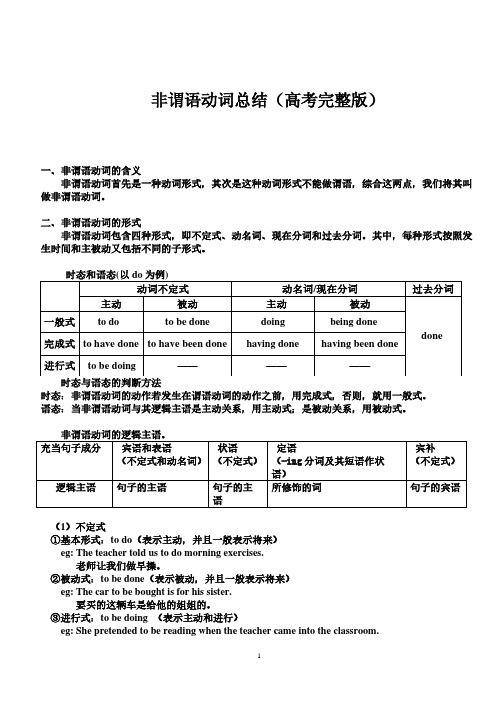
非谓语动词总结(高考完整版)一、非谓语动词的含义非谓语动词首先是一种动词形式,其次是这种动词形式不能做谓语,综合这两点,我们将其叫做非谓语动词。
老师进来时,她假装正在读书。
④完成时:to have done(表示主动和完成)eg: The thief is said to have escaped.据说小偷已经逃跑了。
⑤完成被动式:to have been done(表示被动和完成)eg:The thief is said to have been arrested.据说小偷已经被抓住了。
⑥完成进行式:to have been doing (表示主动和完成进行)eg: She is said to have been working in the factory over the last 20 years.据说在过去的20年里,她一直在这家工厂工作。
(2)动名词①基本形式:doing (表示主动)eg: Travelling in space by ordinary people will be common in the future.在未来,普通人在太空旅行将会是普遍的事情。
②被动式:being done(表示被动)eg: Freddy and his band could go nowhere without being followed by their fans.弗雷迪和他的乐队到哪里都被他们的粉丝跟着。
③完成式:having done(表示主动和完成)eg: I have no idea of his having done such a thing against you.我不知道他做过这样一件违背你的事情。
④完成被动式:having been done(表示被动和完成)eg: Many customers complain of having been given short weight at that shop.很多顾客抱怨在那家商店被缺斤少两过。
非谓语动词高考知识点

非谓语动词高考知识点高考英语中,非谓语动词是一个重要的考点。
非谓语动词包括不定式、动名词和分词形式,它们在句子中可以作主语、宾语、表语、定语、状语等成分。
掌握非谓语动词的用法和特点对于高考英语的复习备考至关重要。
一、不定式1. 不定式的基本形式为“to + 动词原形”,可以用作动词、形容词或名词。
例如:- He wants to become a doctor.(作动词,表示目的)- It's difficult for me to answer the question.(作形容词,修饰难度)- To learn English well is important for us.(作名词,作主语)2. 不定式可以与一些特定的动词、形容词、名词等搭配使用。
例如:- They decided to go hiking this weekend.(动词搭配)- She is happy to see her old friends again.(形容词搭配)- I have no choice but to accept the offer.(名词搭配)3. 不定式还可以出现在感叹句、祈使句中。
例如:- What a great opportunity to travel abroad!(感叹句)- Please remember to turn off the lights when you leave.(祈使句)二、动名词1. 动名词的基本形式为“动词+ing”,可以用作动词、名词或形容词。
例如:- I enjoy swimming.(作动词,表示动作)- Reading books is my favorite hobby.(作名词,作主语)- She bought a running shoe.(作形容词,修饰鞋)2. 动名词可以与某些动词搭配使用,构成固定短语。
例如:- He is good at playing the piano.(搭配动词)- She finished writing the report yesterday.(完成动作)3. 动名词还可以与介词搭配使用。
高考英语总复习 非谓语动词用法
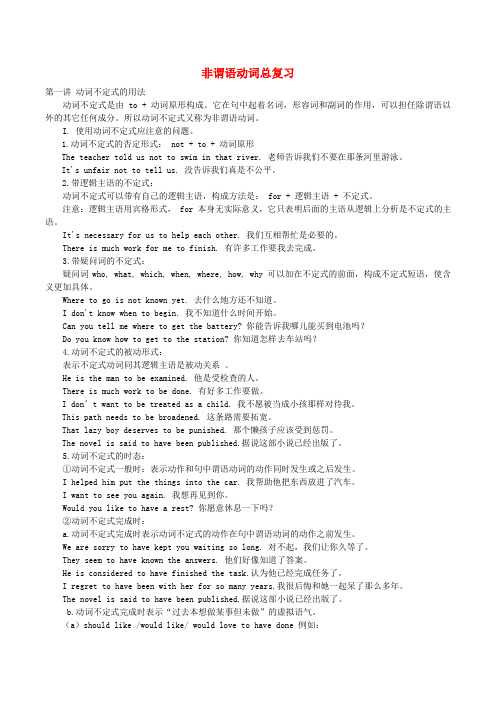
非谓语动词总复习第一讲动词不定式的用法动词不定式是由 to + 动词原形构成。
它在句中起着名词,形容词和副词的作用,可以担任除谓语以外的其它任何成分。
所以动词不定式又称为非谓语动词。
I. 使用动词不定式应注意的问题。
1.动词不定式的否定形式: not + to + 动词原形The teacher told us not to swim in that river. 老师告诉我们不要在那条河里游泳。
It's unfair not to tell us. 没告诉我们真是不公平。
2.带逻辑主语的不定式:动词不定式可以带有自己的逻辑主语,构成方法是: for + 逻辑主语 + 不定式。
注意:逻辑主语用宾格形式, for 本身无实际意义,它只表明后面的主语从逻辑上分析是不定式的主语。
It's necessary for us to help each other. 我们互相帮忙是必要的。
There is much work for me to finish. 有许多工作要我去完成。
3.带疑问词的不定式:疑问词who, what, which, when, where, how, why 可以加在不定式的前面,构成不定式短语,使含义更加具体。
Where to go is not known yet. 去什么地方还不知道。
I don't know when to begin. 我不知道什么时间开始。
Can you tell me where to get the battery? 你能告诉我哪儿能买到电池吗?Do you know how to get to the station? 你知道怎样去车站吗?4.动词不定式的被动形式:表示不定式动词同其逻辑主语是被动关系。
He is the man to be examined. 他是受检查的人。
There is much work to be done. 有好多工作要做。
最全高中非谓语动词固定搭配总结
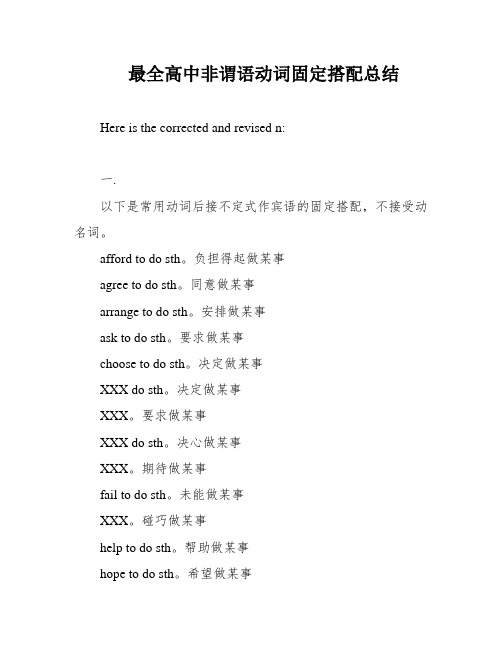
最全高中非谓语动词固定搭配总结Here is the corrected and revised n:一.以下是常用动词后接不定式作宾语的固定搭配,不接受动名词。
afford to do sth。
负担得起做某事agree to do sth。
同意做某事arrange to do sth。
安排做某事ask to do sth。
要求做某事choose to do sth。
决定做某事XXX do sth。
决定做某事XXX。
要求做某事XXX do sth。
决心做某事XXX。
期待做某事fail to do sth。
未能做某事XXX。
碰巧做某事help to do sth。
帮助做某事hope to do sth。
希望做某事learn to do sth。
研究做某事manage to do sth。
设法做某事need to do sth。
需要做某事offer to do XXX主动提出做某事plan to do sth。
计划做某事XXX。
准备做某事XXX。
假装做某事promise to do sth。
答应做某事XXX。
拒绝做某事want to do sth。
想要做某事XXX。
希望做某事XXX。
想要做某事would like to do sth。
想要做某事in order to do sth。
为了做某事seem to do sth。
似乎好像做某事二、以下是常用动词后接动名词作宾语的固定搭配,不接受不定式。
XXX 承认做某事allow doing sth。
允许做某事XXX。
感激做某事XXX。
避免做某事XXX。
考虑做某事delay doing sth。
推迟做某事deny doing sth。
否认做某事discuss doing sth。
讨论做某事XXX XXX。
不喜欢做某事XXX。
喜爱做某事XXX。
逃脱做某事XXX。
完成做某事XXX。
禁止做某事XXX。
原谅做某事Give up doing something means to。
高考英语非谓语动词用法总结(完整)

高考英语非谓语动词用法总结(完整)一、单项选择非谓语动词1.(北京)______ over a week ago, the books are expected to arrive any time now. A.Ordering B.To orderC.Having ordered D.Ordered【答案】D【解析】【详解】考查非谓语动词。
句意:(因为)那些书是一周多之前订的,现在随时有可能送到。
books和order是动宾关系,即order the books/the books are ordered,故用过去分词表示被动和完成,在此相当于原因状语从句because they were ordered...,故选D。
【点睛】分词作状语1. 分词作时间状语相当于when引导的时间状语从句;on doing sth. ="as" soon as sb. does sth.。
2. 分词作原因状语相当于as,since,because引导的原因状语从句。
3. 分词作方式或伴随状语不能用状语从句替换,但是可以改写成并列句。
4. 分词作条件状语相当于if, unless等引导的从句。
常见的可表示条件的分词有given, supposing, considering, provided, compared with等。
5. 分词作结果状语相当于so that引导的结果状语从句。
分词前常有副词thus,thereby,only等。
6. 分词作让步状语相当于though或者even if等引导的让步状语从句。
2.______ to as much English as possible is a good way to learn English well.A.Exposed B.Being exposed C.Having exposed D.To expose【答案】B【解析】试题分析:句意:尽可能多的接触英语是学好英语的很好的办法。
- 1、下载文档前请自行甄别文档内容的完整性,平台不提供额外的编辑、内容补充、找答案等附加服务。
- 2、"仅部分预览"的文档,不可在线预览部分如存在完整性等问题,可反馈申请退款(可完整预览的文档不适用该条件!)。
- 3、如文档侵犯您的权益,请联系客服反馈,我们会尽快为您处理(人工客服工作时间:9:00-18:30)。
1.三种非谓语动词的构成及变化形式。
不定式主动被动一般形式(本身包含将由去做的含义)To do To be done进行形式To be doing完成形式To have done To have been done动词的ING 形式主动被动一般形式(本身包含正在进行的含义)Ving Being Ved完成形式Having Ved Having been Ved (=Ved) ●过去分词done (无变化)解题诀窍:找逻辑主语,辩逻辑关系,析动作先后主动关系,即主语是非谓语动作的发出者被动关系,即主语是非谓语动作的承受者与谓语几乎同时进行doing , S+V being +done , S+V先于谓语动作发生(已经完成)having +done , S+V having been +done, S + V= ( done, S+V)后于谓语动作发生(将要去做,特别是表示目的)(in order (not)/ so as to(not) )todo, S+V ..(in order (not)/ so as to(not) )to be done, S+VI. v. + to do1.wish to do2.hope to do3.promise to do4.decide to do5.refuse to do6.agree to do7.expect to do 8.manage to do=try to do9.fail to do 10.prefer to do11.plan to do 12.want to do13.ought to do 14.have to doed to do/be use to do 16.seem to do17.would like to do 18.in order to do19.so as to do /such...as to do 20.set out to do21.make up one's mind to do 22.take trouble to do23.It takes sb. some time to do 24.be going to do25.be about to do 26.happen to do27.pretend to do/to have done/to be doing28.be thought/believed /said /reported to do29.have no choice but to do30.intend to do31.choose to do32.Offer to do33.Learn to do34.Wish to do35.Apply to do36.Desire to do37.Determine to do=be determined to do38.Afford to do39.in order to do40.hurry to do41.seem、appear、be said、be supposed、be believed、be thought、be known、be reported+to do42.Be about to do43.Be to blame44.Wonder to do45.Remain to be doneE.g. It remains to be seen whether Jim will be fit enough to play in the finals.Having a trip abroad is certainly good for the old couple, but it remains to be seen whether they will enjoy it.II. v. +adj. + to do1. be willing to do2. be likely to do3. be able to do4. too ... to do5. be glad to do6. be determined to do7. be ready to do 8. be sure to do9. be pleased to do 10. be afraid to do11. be surprised to do 12. be eager to do13. be anxious to do14. It is important/necessary...for sb. to do15. be...enough(for sb.) to do 16.be the first/last to do17. be careful not to do/take care not to do18.形容词,形容词最高级,序数词后接to do19.way+to do20..下列词语后常接不定式作定语:chance、wish、right、courage、need、promise、time、opportunity、way、the first、the second、the last、the only等21.导目的状语,enough,too, so…as to do, such + 名词…as to do作结果状语,III. v.+ sb. + to do1. help sb. to do2. order sb. to do3. tell sb. to do4. wish sb. to do5. want sb. to do6. force sb. to do7. get sb. to do 8. drive sb. to do9. forbid sb. to do 10. cause sb. to do11. allow sb. to do 12. permit sb. to do13. persuade sb. to do 14. advise sb. to do15. invite sb. to do 16. prefer sb. to do17. require sb. to do 18. call on sb. to do19. It cost sb. some money to do 20. think/consider sb. to be21.主语+ think / judge / suppose / believe / consider /imagine/consider / feel + sb. + to be/ to have done22.④主语+ call on / upon / depend on / wait for / ask for + sb.+ to do sth.IV. v.+ sb. / sth.+ do/ doing / done1. see2. hear3. notice4. watch5. listen to6. look at7. feel 8. have 9. observee.g. I saw him come in. He was seen to come in.him workingthe problem settledV. v. + do1.can, may, must, should, need, will, dare2.please do3. had better do4. would rather do...(than do)5.why (not) do6.let/make/have sb. do7.have nothing to do but doThere is nothing to do but do They could do nothing but do8.不定式的省略。
①同一结构并列由and或or连接。
I want to finish my homework and go home.I’m really puzzled what to think or say.特例:To be or not to be, this is a question.He is better to laugh than to cry.(表示对比)②不定式作表语,其前面的主语从句中含有do时,后面的to省略。
What he did was lose the game.I think the best thing you should do is look for another job.③句中含有动词do时,but、except、besides、such as等后面to可省略。
即“前有do,后省to”。
Don’t do anything silly, such as marry him.④主句含有不定式,后面有rather than, rather than后省to。
⑤Why not、had better、would rather、can’t but等词后省to。
如:He could not but walk home.VI. v.+ doing/介词后+doing1.enjoy doing2.risk doing3.avoid doing4.keep doing5.practise doing6.suggest doing / sb.'s doing / that sb.(should) do7.miss doing 8. finish doing9. allow / permit doing 10. delay doing11.resist doing 12. consider doing13. mind doing / sb.'s doing / if sb. do14. imagine doing 15. keep on doing16. go on doing 17. insist on doing18. be busy doing 19. set about doing/ [set out to do]20. give up doing 21. feel like doing22. can't help doing23. spend/save/waste/kill/time (in) doing24. It is no use/good doing25. prefer doing to doing26. look forward to doing27. succeed in doing28. be afraid of doing29. have trouble/difficulty (in) doing30 There is trouble / difficulty (in) doing31. prevent / keep /stop sb. from doing32. thank you for doing33. praise sb. for doing34. punish sb. for doing35. excuse sb. for doing / sb.'s doing36. apologize for doing37. be (well) worth doing / be worthy of being done / be worthy to be done38. want / need / require doinge.g. The boy wanted to wash his handkerchief./ The boy wanted washing.I need to buy a new pair of trousers. / The trousers need mending.39. do some reading/washing/cleaning/shopping/cooking/more speaking40. go swimming/dancing/shopping/skating/boating/sightseeing/skiing41.enjoy doing42.practice doing43.admit doing44.allow doing/allow sb to do45.permit doing46.fancy,delay,deny,imagine ,keep,pardon, prohibit, put off,forbid, prohibit,consider doing47.devote oneself to, be worth,pay attention to ,stick to,look forward to,be addicted to沉溺与做某事Be devoted to献身于做某事,专心致力于做某事,be equal to doing等于做某事,能胜任做某事, object to doing, have an objection to doing, be opposed to doing反对做某事, reduce sb to doing是某人沦为做某事,Be used to doing=be accustomed to doing习惯于做某事,get down to doing开始做某事,认真做某事,come/be near/close to doing几乎做某事,差点就坐某事, in addition to doing除了做某事之外.Key to doing做某事的关键,make contributions to doing对、、、坐出贡献,when it comes to doing 谈到、、、时VII. v.+ to do / doingA. 意义差别不大begin/start e.g. When shall we start working/to work?Suddenly it started to rain.Now he began to realize/know his mistakes.B.接doing表示一般情况,接to do表示具体1. like/love e.g. I like swimming. But I don't like to swim this afternoon.2. hate e.g. I hate getting up early. I hate to get up at this time.3. prefer e.g. He prefers doing to talking.I'd prefer to go by bike rather than walk this time.C. 接doing表示已完成的动作,接to do表示未做的动作1. remember e.g. Remember to close the window before you leave.I remember being taken to the Great Wall when I was young.2.forget e.g. Don't forget to lock the door.I'll never forget meeting him for the first time.D.意义有差别1. try e.g. He tried to escape but he was caught.He try unlocking the door with another key.2. stop e.g. Stop talking, please. Let's stop to work.3. go one.g. After he had finished his homework, he went on to write a letter.Having been put into prison, he went on writing songs.4. be afraid to do/of doinge.g. I’m afraid to go out at night.Most people are afraid of snakes.Don’t be afraid of making mistakes when learning a foreign language.5. remember to do sth.记住要做的事remember doing sth.回顾过去发生的事6. forget to do sth.忘记要做的事forget doing sth.忘记做过的事7. regret to do sth.对将要做的事抱歉regret doing sth.对发生过的事后悔8. try to do sth.设法……,试图try doing sth.试试看,试一试9. mean to do sth.打算做……,想要mean doing sth.意味着,就是10.can’t help [to] do不能帮助做某事Can’t help doing情不自禁做某事需注意问题:不定式做定语和所修饰词构成动宾关系时应注意:1.句中有动作的执行者时,用主动式此时,A.动词不定式要有及物性B.用主动表被动C.不定式不再跟宾语I’m not sure which restaurant to eat at.Will you please tell me why you had no pen to write with ?I have a very difficult problem to work out.I have a lot of readings to complete before the end of this term.2,句中没有动作执行者,动词不定式用被动式It is one of the important problems to be solved tomorrow.His first book to be punished next month is based on a true story.3.有时用被动表示让别人做Have you got anything to be taken to your parents?I have lots of clothes to wash.4.主系表结构后面的不定式的逻辑宾语时句子的主语时,不定式:用主动,要具有及物性,不带宾语English is hard to learn.I find these problems are easy to work out.The morning air is so good to breathe.In many people’s opinion, that company though relatively small, is pleasant to deal with.5.状语从句的省略A.主句和从句的主语一致,或从句主语为it.B.从句谓语动词中含有be。
